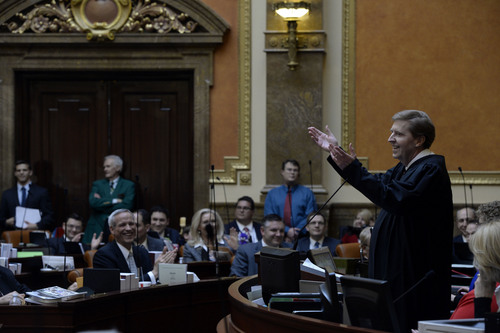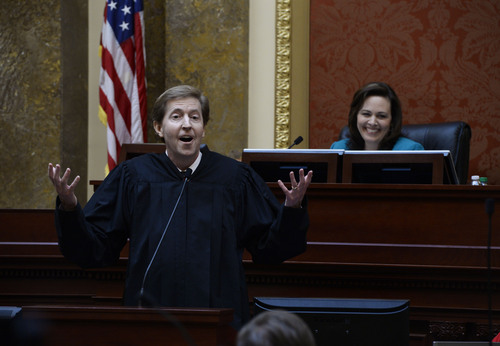This is an archived article that was published on sltrib.com in 2014, and information in the article may be outdated. It is provided only for personal research purposes and may not be reprinted.
Despite years of tight budgets and personnel losses, Utah's courts are thriving, Utah Supreme Court Chief Justice Matthew Durrant told legislators Monday in his annual State of the Judiciary address.
That's why the courts will not be asking the Legislature to restore monies lost to past budget cuts, Durrant said — they don't need to.
The chief justice's tone was a shift from last year's address in which Durrant asked the legislature to support funding for two new judges in the 8th District serving the Uinta Basin.
"We are proud of the success of our new business model and of our ability to use existing resources to provide increased access, efficiency and transparency in everything we do," Durrant said. "We are also proud that we have not asked and are not asking you to restore funding cuts of the past few years."
Much of the court system's strides in maximizing its efficiency, the justice said, could be chalked up to the recent implementation of mandatory electronic records filing, which requires lawyers, judges, clerks and citizens to file and maintain all paperwork electronically.
Since digitizing the records, the court system has cut 8 percent of its clerks, saved $150,000 on file folders and $210,000 on paper, Durrant said. In Summit County, an old file storage room has been converted into a courtroom — saving the state thousands of dollars that would have otherwise been needed to create a new court space.
Durrant also praised the courts'new openness by allowing television cameras, computers and smart phones into courtrooms, thereby allowing hearings and trials to be live-broadcast to the public.
Since the new rule allowing cameras in the courtroom was enacted on April 1, 2013, Durrant said, more than 100 cases have been recorded by the media in district, juvenile and justice courts.
"It is our hope that by allowing cameras into the courtroom we will bring the work of our courts closer to the public," Durrant said, "and that the trust and confidence of the public in the fairness and effectiveness of Utah's courts will continue to increase."
One area the chief justice highlighted as in need of improvement was court accessibility — providing quality lawyers and legal help to low-income populations, ensuring non-English speaking populations will have interpreters available to help them navigate the legal process and limiting the cost in time and travel it takes for Utahns to reach a courthouse.
Over the summer, the state's Judicial Council, a policy making body that oversees Utah's court system, began exploring what works and what doesn't in the state's patchwork system of indigent defense.
The committee would recommend solutions after gathering data on the problem and working with the Sixth Amendment Center to evaluate the best way for Utah to address these lapses, officials said. But Durrant didn't specify this effort or its progress in his speech Monday.
Utah is one of only two states in the country that provides neither funding nor oversight to counties charged with organizing and implementing a system for defending poor people in criminal court.
"This is where our greatest challenges lie," the chief justice said. "This is also where we are seeing tremendous progress, although the amount of work that remains is daunting."
Despite this and other areas that have room for improvement, Durrant said, the judiciary has received a resounding thumbs-up from its constituents: 93 percent of lawyers, witnesses and citizens surveyed reported having a "satisfactory" experience with the courts, and 96 percent reported feeling as though they had been treated with dignity and respect.
"Keep in mind that a court decision often results in both a winner and a loser," Durrant said. "So for 93 percent of those respondents to say they were satisfied with their experience is remarkable."
It's an approval rating other branches of government can only dream of, joked House Speaker Becky Lockhart.
"I don't think we have that," she said. "We should all hope for 93 percent."
Twitter: @Marissa_Jae





